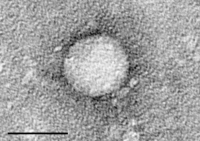
Photo from wikipedia
WHAT IS KNOWN AND OBJECTIVE In Japan, ledipasvir/sofosbuvir, elbasvir/grazoprevir and glecaprevir/pibrentasvir are recommended as first-line treatments for patients with untreated hepatitis C virus genotype 1. Although they have demonstrated a… Click to show full abstract
WHAT IS KNOWN AND OBJECTIVE In Japan, ledipasvir/sofosbuvir, elbasvir/grazoprevir and glecaprevir/pibrentasvir are recommended as first-line treatments for patients with untreated hepatitis C virus genotype 1. Although they have demonstrated a high efficacy in clinical trials, there are no direct comparative studies. Clarification of their effectiveness and safety in real-world clinical practice is required. Therefore, we conducted a retrospective multicentre study on the effectiveness of these direct-acting antivirals in real-world clinical practice. METHODS We retrospectively evaluated the clinical data of untreated patients with persistent HCV genotype 1 infection who started first-line treatment with ledipasvir/sofosbuvir, elbasvir/grazoprevir or glecaprevir/pibrentasvir between September 2015 and January 2019 at 11 medical institutions in Japan. The primary efficacy endpoint was a sustained virologic response after 12 weeks of treatment. The secondary endpoints included sustained virologic response after 24 weeks of treatment and end of treatment response. The safety endpoint was treatment completion rate. RESULTS AND DISCUSSION During the study, 420 patients (median age, 70 years; 181 males) received ledipasvir/sofosbuvir, 48 (median age 72, years; 29 males) received elbasvir/grazoprevir and 63 (median age 66, years; 35 males) received glecaprevir/pibrentasvir. For ledipasvir/sofosbuvir, elbasvir/grazoprevir and glecaprevir/pibrentasvir, the sustained virologic response after 12 weeks of treatment was 98.6%, 97.9% and 100%; the sustained virologic response after 24 weeks of treatment was 99.0%, 97.7% and 100%; the end of treatment response was 99.8%, 97.9% and 98.4%; and the treatment completion rate was 98.3%, 91.7% and 100% respectively. WHAT IS NEW AND CONCLUSION In real-world clinical practice, hepatitis C virus treatment with ledipasvir/sofosbuvir, elbasvir/grazoprevir and glecaprevir/pibrentasvir was effective with safety.
Journal Title: Journal of clinical pharmacy and therapeutics
Year Published: 2022
Link to full text (if available)
Share on Social Media: Sign Up to like & get
recommendations!